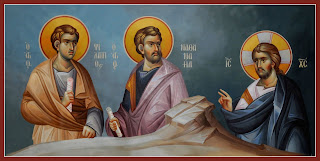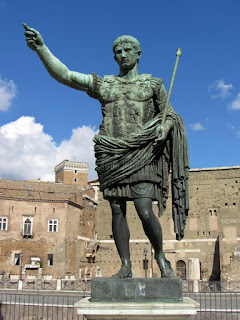I have been talking recently about the question of Authority
in Bible study and in United Methodist thought.
The second leg of the so-called Wesleyan Quadrilateral is Tradition. Now, I’ll have to admit that whenever I hear
the word “tradition” my head fills with the voice of Tevye in Fiddler on the
Roof singing that great song Tradition.
Who, day and night, must scramble for a living,
Feed a wife and children, say his daily prayers?
And who has the right, as master of the house,
To have the final word at home?
The Papa, the Papa! Tradition.
The Papa, the Papa! Tradition.
Who must know the way to make a proper home,
A quiet home, a kosher home?
Who must raise the family and run the home,
So, Papa's free to read the holy book?
The Mama, the Mama! Tradition!
The Mama, the Mama! Tradition!
The song carries with it a common perception of
tradition. For many, the term means, “The
way we have always done it.” We have
traditions that accompany holidays, birthdays, and vacations. We eat certain foods, support certain sports
teams, drive a particular make of automobile often out of “tradition.”
For the church, Tradition carries a different
connotation. I wrote in an earlier post about
Scripture as authority. Scripture is
closed. We are not going to add any
other books to the Bible. And I
seriously doubt that any portion of holy writ will ever be excised. So, in a sense, scripture is static. It is unchanging. It is set.
The church understands Tradition to be the ongoing revelation of
God. As times change, things arise that
the Bible simply does not address.
I think all Christian groups would claim to be biblical at
their core. But the children of Wesley realize that there are other forces,
godly forces, which inform our interpretation of the Bible, or which guide us
in our deliberations in those areas where the Bible does not contain explicit
instruction. One of those is Tradition. Now, that's Tradition with a capital "T". This
is not talking about going to Grandma's House every Thanksgiving. Tradition is
understood in the church as the ongoing revelation of God. Our comprehension is
that God did not cease speaking to the church with the close of the Book of
Revelation. Rather, God has spoken, inspired, led and revealed the Divine Will
to Christians through the ages.
You know that we are part of a Creation that is constantly changing.
For example, those of you who were receiving your education over ten years ago,
did your vocabulary tests include the word "microchip?" Did your education include
the concept of "information superhighway?" I held a funeral recently for a man who grew
up riding a horse-drawn carriage. He can remember the first automobile that ever drove through this county.
And he died having seen people walk on the moon. In such a Creation, we
desperately need the fresh, ongoing leadership of our God. As God is revealed
to the Church rather than to individuals, we call that revelation Tradition.
This would include the writings of the Patriarchs of the Church. It would include
the work of the great Ecumenical Councils. It would even include, I hope, some
of the deliberations of General, Jurisdictional, and Annual Conferences. Now,
you might have to look hard to find that in some conference meetings I have seen.
But I trust, by the grace of God, that it is there.
Tradition asks the question, "How has the church always
viewed this?" We trust that the accumulated knowledge of the church has a
kind of validity. Sometimes, that knowledge must change. "The world is
flat.'* "The sun revolves around the earth." "Women just aren't
called to preach." Errors, some of them of long standing, when exposed,
must be addressed by a transformation of Tradition. Another way of saying that is,
"We have been inspired by God."
Tradition includes the way we do things. It involves the
liturgy of the church, our hymns, and approach to rites of passage and other
transitions in our being. Tradition is not the acts themselves. That's tradition with a little "t". Tradition
is how the way in which we do things
reflects the revelation of God.
It has been said, somewhat cynically, that the seven last
words of the church are "We never did it that way before." We should certainly
be cautious about becoming too entrenched in particular behaviors. But we must also remember that there are
doctrines that have stood the test of time. Wesley's concept of Tradition keeps
us from being swept away by every fad or novelty that comes along. Tradition in the church is the accumulated knowledge
and revelation of two thousand years of faith history. As we appeal to the authority of Tradition, we affirm that God still speaks, leading Kingdom people day by day.
The peace of the Lord be with you.

















